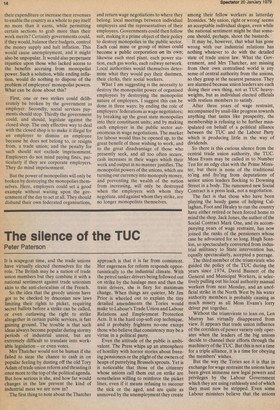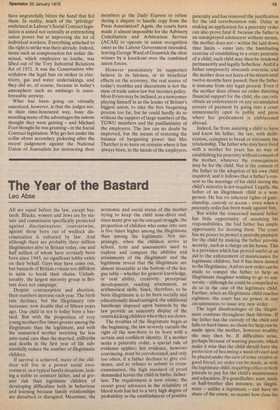The silence of the TUC
Peter Paterson
It is scapegoat time, and the trade unions have virtually elected themselves for the role. The British may be a nation of trade union members but they combine it with a national sentiment against trade unionism akin to the anti-clericalism of the French.
So the idea that the greedy unions have got to be checked by draconian new laws limiting their rights to picket, requiring secret ballots before a strike can be called, or even outlawing the right to strike altogether in certain public services, is fast gaining ground. The trouble is that such ideas always become popular during stormy periods of industrial unrest, but are extremely difficult to translate into workable legislation — or even votes.
Mrs Thatcher would not be human if she failed to sieze the chance to cash in on popular feeling by dusting off the old Tory Adam of trade union reform and thrusting it once more to the top of the political agenda. But how serious is she, and how far would changes in the law prevent the kind of industrial mess we are now in?
The first thing to note about the Thatcher approach is that it is far from consistent. Her eagerness for reform responds opportunistically to the industrial climate. With the petrol tanker drivers being followed out on strike by the haulage men and then the train drivers, she is fiery for maximum change. When things are quieter, Mr Jim Prior is wheeled out to explain the tiny detailed amendments the Tories would make to Labour's Trade Union and Labour Relations and Employment Protection Acts. It is the hard cop-soft cop technique, and it probably frightens no-one except those who believe that consistency may be a virtue in a political party.
Even the attitude of the public is ambivalent. The Press whips up an atmosphere of hostility with horror stories about freezing pensioners or the plight of the owners of heaps of putrefying Brussels sprouts. Yet is is noticeable that those of the citizenry whose unions call them out on strike are nonetheless willing to reinforce the picket lines, even if it means refusing to succour the sick or the aged, and are quite as unmoved by the unemployment they create among their fellow workers as latterday Ironsides. 'My union, right or wrong' seems an acceptable individual slogan, even while the national sentiment might be that someone should, perhaps, shoot the bastards.
It may be, however, that what has gone wrong with our industrial relations has nothing whatever to do with the detailed state of trade union law. What the Government, and Mrs Thatcher, are missing from their own centralised world is any sense of central authority from the unions, so they grasp at the nearest panacea. They are alarmed because union leaders are each doing their own thing, not as TUC heavyweights, but as individual elected officials with restless members to satisfy.
After three years of wage restraint, accompanied by snail-like progress towards anything that tastes like prosperity, the membership is refusing to be further manipulated on behalf of a political alliance between the TUC and the Labour Party which is producing little in the way of dividends.
So there is this curious silence from the central trade union authority, the TUC.
Moss Evans may be called in to Number Ten for an edgy chat with the Prime Minister, but there is none of the traditional to'ing and fro'ing from deputations of senior union leaders flocking to Downing Street in a body. The rumoured new Social Contract is a press leak, not a negotiation.
The fact is that those who have been playing the heady game of helping Cal laghan, Foot and Healey to run the country have either retired or been forced home to mind the shop. Jack Jones, the author of the Social Contract Mark One, and its accom panying years of wage restraint, has now joined the ranks of the pensioners whose case he advocated for so long. Hugh Scanlon, so spectacularly converted from industrial militancy to State intervention has, equally spectacularly, accepted a peerage.
The third member of the triumvirate who guided the policy of the TUC during the years since 1974, David Basnett of the General and Municipal Workers, is selectively pulling out his local authority manual workers from next Monday, and an unofficial strike in the North West by his water authority members is probably causing as much misery as all Moss Evans's lorry driver put together.
Without the triumvirate to lean on, Len Murray has virtually disappeared from view. It appears that trade union influence of the corridors of power variety only operates when the leaders of the big unions decide to channel their efforts through the machinery of the TUC. But this is not a time for a triple alliance, it is a time for obeying the members' wishes.
But the way the Tories see it is that in exchange for wage restraint the unions have been given immense new legal powers and privileges by the Labour Government which they are using ruthlessly and of which they must now be stripped. Even some Labour ministers believe that the unions have ungratefully bitten the hand that fed them. In reality, much of the 'privilege' enshrined in Labour's Social Contract legislation is aimed not centrally at entrenching union power but at improving the lot of individual workers. Everything attached to the right to strike was there already. Indeed, items such as compensation for unfair dismissal, which employers so loathe, was lifted out of the Tory Industrial Relations Act of 1971. It was the Conservatives who withdrew the legal ban on strikes in electricity, gas and water undertakings, and they did so, of course, because in today's atmosphere such an embargo is unenforceable anyway.
What has been going on virtually unnoticed, however, is that the judges are, in their time-honoured way, busy dismantling many of the advantages the unions thought they were gaining — and Michael Foot thought he was granting —in the Social Contract legislation. Why get hot under the collar about secondary picketing after the recent judgement against the National Union of Journalists for. instructing their members at the Daily Express to refuse during a dispute to handle copy from the Press Association? Again, the courts have made it almost impossible for the Advisory Conciliation and Arbitration Service (ACAS) to operate in union recognition cases as the Labour Government intended, leaving George Ward of Grunwick the clear winner by a knockout over the combined union forces.
However passionately its supporters believe in its fairness, or its beneficial effects on the economy, the real source of today's troubles and discontents is not the state of trade union law but incomes policy. Moss Evans may be inclined, as a newcomer playing himself in as the leader of Britain's biggest union, to take the free bargaining process too far, but he could hardly do so without the support of large numbers of the TGWU members and the pusillanimity of the employers. The law can no doubt be improved, but the means of restoring the balance of bargaining power that Mrs Thatcher is so keen on remains where it has always been, in the hands of the employers.



































 Previous page
Previous page